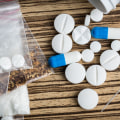Drug addiction is a complex and chronic condition that requires a comprehensive approach to treatment. Counseling and other behavioral therapies are the most commonly used forms of treatment, and medications can also be an important part of the process. Cognitive-behavioral therapy (CBT) is a valuable tool for many types of addiction, including food addiction, alcohol addiction, and prescription drug addiction. It can help individuals recognize their unhealthy behavior patterns and develop coping skills.
Rational emotional behavioral therapy (REBT) is another form of talk therapy that can help people recognize their negative thoughts and provide them with ways to combat feelings of self-defeat. In addition to talk therapies, drug and alcohol detoxification is an important part of the recovery process. This supervised period of withdrawal control allows the treatment team to stabilize a person in the early stages of recovery and make them as comfortable as possible while their body gets rid of substances. The effectiveness of behavioral therapy for treating addiction depends on the individual, their level of participation in the treatment, the therapist, and the type of therapy being given.
Treatment plans should be reviewed frequently and modified to adapt to the patient's changing needs. Intensive inpatient treatment and detoxification may be necessary before transitioning to outpatient treatment and post-care support. Group sessions are especially useful because they create bonds between participants and provide them with different perspectives on the recovery process. Sober living homes provide a safe and supportive place to live while recovering from drug addiction.
The main purpose of psychotherapy is to help people gather the tools needed to deal with triggers and cravings without indulging in drugs or alcohol. Addiction treatment can be effective, but it must be continuously monitored and adjusted to the needs of the person suffering from it to improve long-term management of addiction. After talking with you, your healthcare provider may recommend a medication as part of your treatment for opioid addiction. We can quickly help you or your loved one understand your addiction treatment options, offer you more free resources, and help you determine your next best steps. The good news is that addiction is now better understood than ever, which means better treatment for all.






